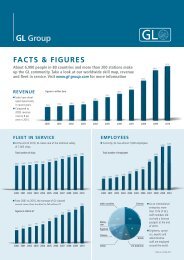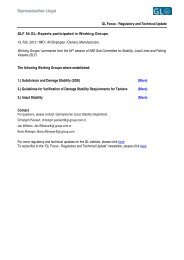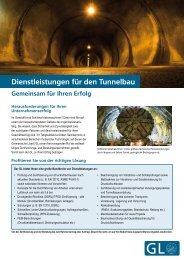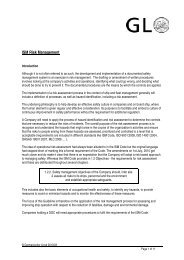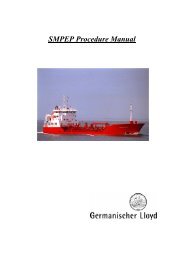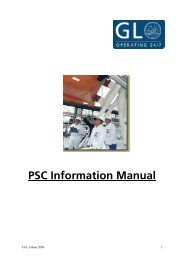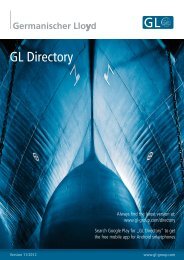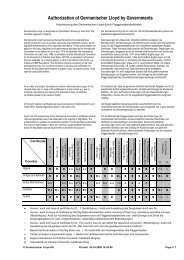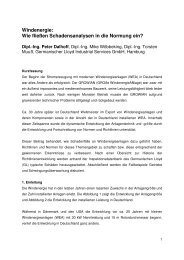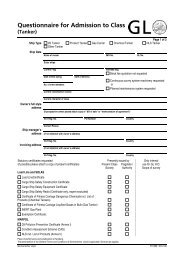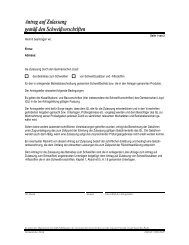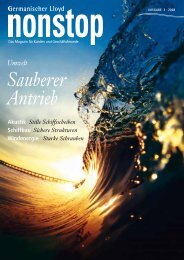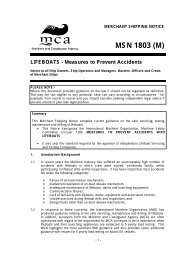Yards Moving Forward - GL Group
Yards Moving Forward - GL Group
Yards Moving Forward - GL Group
Create successful ePaper yourself
Turn your PDF publications into a flip-book with our unique Google optimized e-Paper software.
PORT STATE CONTROL<br />
Again, the Winner is …<br />
This year, the European port state statistics once again<br />
awarded the top slot to Germanischer Lloyd. In the current<br />
evaluation of all statutory inspections of ships within the<br />
scope of the “Paris Memorandum of Understanding” (Paris<br />
MoU) in 2005, the vessels under attendance by Germanischer<br />
Lloyd achieved the best results. The Paris MoU determined<br />
the number of class-relevant detentions for each classification<br />
society and expressed them in relation to the total number<br />
of statutory inspections during the years 2003 to 2005.<br />
According to these figures, a total of 11,882 inspections were<br />
conducted on ships classified by Germanischer Lloyd.<br />
In only 43 cases did class-relevant deficiencies prevent a<br />
direct onward passage of the ships. The relationship between<br />
inspections and detentions yields an excess factor of -1.57,<br />
which is also the lowest value for the 25 classification societies<br />
considered. In view of the considerable growth exhibited by<br />
the Germanischer Lloyd fleet in recent years, Executive Board<br />
Member Rainer Schöndube expressed his great satisfaction<br />
with the outcome: “We view these results as being clear confirmation<br />
of our uncompromising philosophy of safety and<br />
quality – a philosophy we have implemented in concert with<br />
our customers to the benefit of all people and the environment.”<br />
PORT STATE CONTROL AND CLASSIFICATION<br />
The owner or operator of the ship is responsible for the safety<br />
of a ship and its crew, the protection of the marine environment<br />
and proper living and working conditions on board.<br />
There are international regulations which govern which standards<br />
have to be observed. The flag state as the certifying authority<br />
for the ship, or the recognized organization acting on<br />
its behalf (a classification society, as a rule), is responsible for<br />
ensuring compliance. As the final authority in the chain, Port<br />
State Control conducts spot checks to see whether this<br />
responsibility has indeed been fulfilled. The ships are selected<br />
according to the criteria of the Paris Memorandum of<br />
Understanding (Paris MoU) and the European PSC Directive.<br />
All ships to be examined are at least subjected to an “initial<br />
inspection” in accordance with the applicable provisions. This<br />
includes a check of all certificates and documents of the ship<br />
and its crew as well as a general examination of the vessel’s<br />
condition. A “more detailed inspection” is performed if,<br />
MARITIME SERVICES · NEWS<br />
during the initial inspection, there were clear grounds to<br />
believe that the requirements of the relevant international<br />
conventions have not been met. The required rectification of<br />
the deficiencies is specified in the inspection report and, if<br />
necessary, the ship is detained in the port until these shortcomings<br />
have been resolved.<br />
Port State Control is based on an agreement of the maritime<br />
transport authorities of Northwestern Europe dating back to<br />
26 January 1982. It is aimed at achieving greater effectiveness<br />
in the enforcement of the international conventions and provides<br />
for the annual inspection of at least 25 percent of all<br />
ships calling at European ports.<br />
In 2003, the implementation regulations were tightened up.<br />
From this time on, oil tankers over 3,000 GT and older than 15<br />
years, gas and chemical tankers older than 10 years, bulk carriers<br />
older than 12 years as well as passenger ships older than<br />
15 years must be subjected to a “mandatory expanded inspection”,<br />
insofar as the previous expanded inspection took place<br />
more than twelve months earlier.<br />
EVERYTHING SHIPSHAPE – FEWER CHECKS NEEDED<br />
At present, efforts are under way to achieve a further optimization<br />
of the port state controls. In future, the PSC inspectors<br />
are to look not only at the usual quantitative aspects (25 percent<br />
of the incoming vessels), but increasingly also at the condition<br />
of the ships. The objective of the new monitoring procedure<br />
is to reward shipowners who keep their vessels in good<br />
condition by extending the inspection intervals up to two<br />
years. Ships with poor maintenance, on the other hand, will<br />
be subject to increased scrutiny; they will run the risk of being<br />
inspected more critically and at shorter intervals. Moreover,<br />
work is progressing on a further harmonization between the<br />
inspection criteria of the port states according to the Paris<br />
und Tokyo MoUs, and joint inspection campaigns are<br />
planned (see also nonstop Edition 4/2005). The new arrangement<br />
was formulated by a working group with representatives<br />
of the Paris MoU and the European Commission over the past<br />
few years. As soon as the European Parliament gives the green<br />
light, it can come into force.<br />
For further information: Peter Graaf, Deputy Head of Flagstate Affairs / IACS,<br />
Phone: +49 40 36149-189, peter.graaf@gl-group.com<br />
nonstop 3/2006 13



